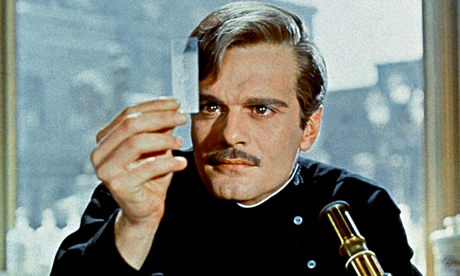
The cold war was never the monopoly of armed forces. Politicians also deployed the weapons of what we now call soft power. Propaganda was in constant use. Both sides were conscious of the potential for nuclear holocaust. They wanted to win the war without fighting. Each side believed in the justice and plausibility of its worldview and sought to disseminate it across the iron curtain.
Western intelligence agencies sent volunteers with Bibles, poems and political tracts as well as, we now discover, illicit copies of Boris Pasternak's Doctor Zhivago. The Vatican dispatched young priests to Catholic areas of the Soviet bloc. Radio stations such as the Voice of America and the BBC transmitted news for shortwave receivers; they also used defectors as commentators – and the communist jamming facilities failed to prevent much of this traffic from getting through.
The extraordinary thing about Doctor Zhivago was that it was no external product but originated from inside the USSR. Though Pasternak had a troubled relationship with the authorities, he never directly challenged them. But his novel inevitably annoyed the official censors by depicting the October revolution and civil war with fairness to both the Reds and the Whites. It implied a preference for individual conscience and personal decency over any ideology imposed by government or army; and it highlighted the degrading effects of power on those who wield it.
Everyone who read the typescript – from the oddball Italian communist Giangiacomo Feltrinelli through to the Soviet desk officers of MI6 and the CIA – recognised it as political dynamite. The Kremlin leader Nikita Khrushchev banned Pasternak from travelling to Sweden to accept his Nobel prize. The KGB tried to hold the USSR in cultural quarantine, and the novel was withheld from publication in Moscow until 1988, when the communist order was already starting to fall apart. In the west, the novel was a bestseller that helped to counteract the allure of communism.
Khrushchev and his successors responded to the western soft power offensive with a literary counterattack: they published Graham Greene in huge editions. The British author earned substantial rouble royalties. As the rouble was not a convertible currency, Greene could not spend his earnings outside the USSR – and there was only so much caviar he could consume on his infrequent trips. More to the point, Greene appeared freely in print in the west. By contrast, those foreign authors who were published only in Moscow were usually the dreariest hacks.
The USSR propaganda machine got lucky in 1961 when it sent the first human being into orbit in outer space. Yuri Gagarin had a rock star's good looks. No sooner had he landed back on earth than he was shipped abroad on a goodwill tour, a pawn in the cold war chess game. The footballer Lev Yashin was another global superstar. At the 1972 Munich Olympics, the gymnast Olga Korbut won the world's admiration; and the politburo knew how to use her fame to enhance the reputation of Soviet communism.
Western spy networks and international radio stations worked hard to counteract Moscow's efforts. In fact, though, only a few thousand Soviet citizens managed to obtain and read the copies of Doctor Zhivago smuggled in from the west. The KGB was efficient at breaking up the supply chain.
But not even the secret police could impose a total cultural quarantine. In Soviet Estonia, viewers could pick up Finnish broadcasts on their TV sets. And, much as the censors endorsed Graham Greene's exposés of capitalist exploitation, his readers in the USSR went to him for a devil-may-care attitude that had been expunged from contemporary Russian literature. The west's soft power was winning out against that of the Soviet Union decades before communism experienced political collapse. Smuggled blue jeans and Beatles LPs were prized by teenagers in Moscow and Leningrad. No amount of official agitprop worked as an ideological prophylactic.
Western liberal democracies now have to face up to challenges from different competitors. But the arena of conflict, at least as far as cultural values are concerned, is not entirely new. As in the cold war, the task will be to convince enemies and sceptics that our way of life, despite its imperfections, is better than their way of intolerance, terrorism or all-out war.

